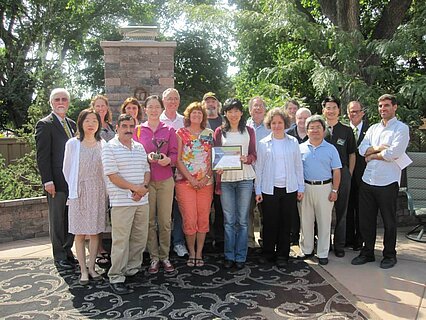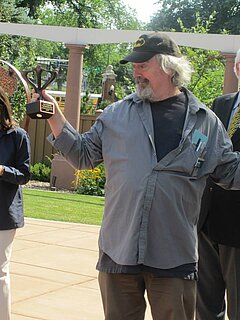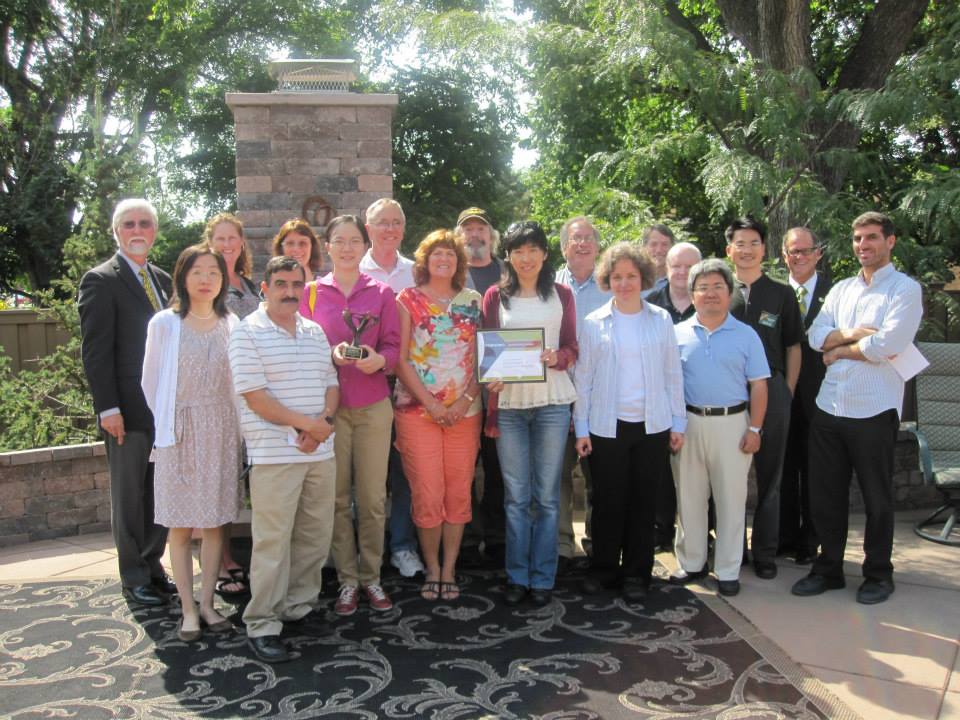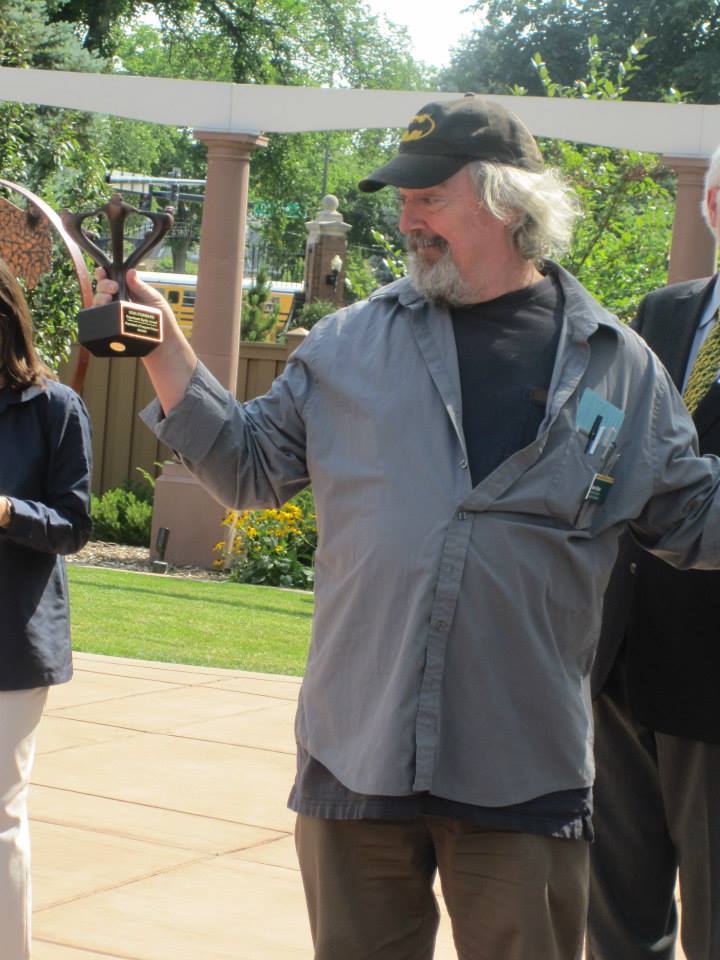News Archive 2013
Mathematics, Computer Science major receives Goldwater scholarship
November 27, 2013
NDSU student Zechariah Andersen was among 282 awardees nationwide selected for the prestigious Barry M. Goldwater Scholarship for the 2012-13 academic year.
The scholarship is awarded annually to college sophomores and juniors and covers the cost of tuition, housing, books and fees up to $7,500 per year. Students are nominated by faculty members and selected through an independent review process. Andersen was the sole North Dakota University System student to receive the scholarship in 2012.
“I’m honored to receive this scholar- ship,” Andersen said. “The best feeling was seeing myself on a list of students from top-tier universities like MIT and Stanford.”
Andersen is a native of Velva, N.D., majoring in mathematics and computer science, with plans to pursue a graduate degree. He is vice chair of the NDSU Association for Computing Machinery.
In addition, Andersen participates in the Ronald E. McNair Scholarship Program, which is intended to help undergraduate students achieve academic success and increase the number of professors from traditionally under-represented populations. Established by Congress in 1986, the Barry M. Goldwater Scholarship and Excellence in Education Program was created to encourage outstanding students to pursue careers in mathematics, the natural sciences or engineering to foster excellence in those fields.
Aiding agriculture: Computer scientists help in the field
November 27, 2013
Agriculture is continually evolving. In today’s world, farmers are required to do much more than buy seeds, plant them and harvest a crop to stay competitive. Acquiring and analyzing data is becoming a high-tech tool in the industry.
Anne Denton, James A. Meier Junior Professor of computer science, is leading two separate but related projects that use data mining techniques to improve agricultural production in the Red River Valley. Both projects involve sugar beets – one of the area’s biggest cash crops.
For the past three years, researchers have been partnering with American Crystal Sugar Co., John Deere and RDO Equipment Co. to determine and predict the expected sugar beet harvest yield while the crop is still in the ground. The project is part of the Department of Computer Science’s Industry-University Consortium Program.
American Crystal Sugar, the region’s largest sugar beet cooperative, already collects and maintains data from its growers’ several thousand fields. The problem is making the data understandable and functional. Traditionally, Denton said, predicting sugar yield was a statistics regression problem. However, data mining techniques have helped researchers discover and analyze the most important attributes. “That was the key breakthrough,” Denton said. “We’ve been able to analyze information with data mining techniques rather than statistical.”
Denton and two other professors from the computer science department also were awarded a $599,722 National Science Foundation – Partnership for Innovation grant. It marks the first time a North Dakota institution is the lead institution for the this type of grant. Denton is the principal investigator along with David Franzen, Extension soil specialist; John Nowatzki, agricultural machine systems specialist; Kambiz Farahmand, professor of industrial and manufacturing engineering; Phillip Boudjouk, retired vice president for research and creative activity; and Dean Knudson, associate professor.
The Smart Farm project includes a data-driven decision support system incorporating sensor data, satellite images and weather information to allow farmers to respond flexibly to production and environmental needs. In the initial phase, sugar beets are the prototype application thanks largely to the previously established industry-university consortium partnerships.
Techniques and results from either project might one day aid other crops, such as corn and soybeans. It’s an interesting application for Denton, who remains involved in both ongoing projects. Her research is largely comprised of developing data mining techniques for diverse problems, ranging from bioinformatics to optical luminescence.
“I didn’t have an agriculture background,” Denton said. “I jumped into whatever was needed. Data mining holds it all together.”
Walia wins best paper award at symposium
November 2013
Computer Science Assistant Professor Gursimran WaIia attended the 24th IEEE International Symposium on Software Reliability Engineering in Pasadena, CA and won two best paper awards!
BEST RESEARCH PAPER AWARD for the paper, Goswami, A., Walia, G. "An Empirical Study of the Effect of Learning Styles on the Faults found During the Software Inspection" Proceedings of the 24th IEEE International Symposium on Software Reliability Engineering - ISSRE'2013, Research Track. Pasadena, CA, USA. [Acceptance Rate = 35% (46/131)]
Goswami, A. is a Ph.D student working under the direction of Dr. Gursimran Walia at North Dakota State University
BEST INDUSTRY PAPER AWARD for the paper, Walia, G., Carver, J. "Using Capture-Recapture Models for Make Objective Post-Inspection Decisions" Proceedings of the 24th IEEE International Symposium on Software Reliability Engineering - ISSRE'2013, Industry Track. Pasadena, CA, USA. [Acceptance Rate = 35% (46/131)]
Dr. Jeffrey C. Carver is a research collaborator and associate professor at the University of Alabama.
Congratulations, Dr Walia!
Dr Yan receives two exciting grants
November 4, 2013
Dr Changhui Yan received two exciting grants —Congratulations!
- ABI-Innovation: Computational Methods for Macromolecular Binding Analysis
Funding agency: National Science Foundation
PI: Dr. Changhui Yan
Sponsored period: 8/1/2013-7/31/2016
Total Award: $301,702
Project Abstract: In this project Dr. Yan develops computational methods for automated discovery of structural and physical-chemical elements contributing to the affinity and specificity of macromolecular binding. To achieve this goal, Dr. Yan develops graph models for the representation of protein structures and graph kernel-based machine-learning methods for the analysis and prediction of binding sites. The proposed graph models provide a succinct data structure to encode a range of structural and physical properties germane to molecular interactions. Dr. Yan uses an innovative graph-kernel-based approach to investigate the modular organization of binding sites and discover characteristic patterns associated with the modules. - II-NEW: ABC—A Biology Cloud.Funding agency: National Science Foundation
PI: Dr. Changhui Yan. Co-PIs: Dr. Anne Denton, Dr. Christopher Colbert, and Dr. Sangita Sinha.
Sponsored Period: 9/1/2013-8/31/2016
Total Award: $314,774
Project Abstract: The ongoing revolution in next generation sequencing (NGS) technologies and large-scale structural genomics projects has led to dramatic increase in genomic sequences and protein structures. This has brought biological research into a data-driven era, where computational methods and facilities are needed for handling and analyzing the huge volumes of data. In this project, the PIs develop a cloud computing infrastructure called A Biology Cloud (ABC) to support research in the areas of bioinformatics and computational biology. ABC is built based on the OpenStack, which is supported by more than 180 large companies and has quickly become the standard for cloud infrastructure. ABC will enable researchers at North Dakota State University (NDSU) to conduct pioneering research in their respective fields and promote and facilitate cross-disciplinary collaborations among them.
NDSU ACM Members teach PowerPoint to 4th Graders
September 8, 2013
NDSU ACM members went to Madison Elementary School in Fargo to teach PowerPoint to 4th Graders on September 25. It was the first time members of ACM has taught PowerPoint in a school. They will be teaching again the end of October, November, and possibly December.
Computer Science receives the 2013 Advance FORWARD Department Award
The Computer Science department received the 2013 Advance FORWARD Department Award at the annual FORWARD kickoff event held Sept. 4. The $5,000 award is presented annually by the NDSU Commission on the Status of Women Faculty to recognize and reward significant department efforts to improve campus climate and gender equity within the faculty ranks. A review panel evaluated nominations/applications, guided by a weighted rubric reflecting each of FORWARD’s five target areas: climate, recruitment, retention, promotion and leadership.
The review panel noted Computer Science’s exceptional commitment and progress to the recruitment and retention of women within the department. Six of 12 hires since 2004 have been women. The resulting 37.5 percent women faculty in Computer Science is more than double the 17.6% national average and also represents a dramatic increase over the 7.1% proportion in the NDSU computer science department a decade ago.
NDSU student team takes second place at ‘MechMania’ competition

October 2013
The NDSU student chapter of the Association for Computing Machinery (NDSU ACM) recently took second place in a prestigious Midwest programming competition. The group participated in “MechMania” at the annual “Reflections | Projections” ACM conference at the University of Illinois at Urbana-Champaign Oct. 7-9.
MechMania is a 24-hour artificial intelligence programming competition of which the NDSU ACM has been a perennial competitor. The contest is an outstanding learn-by-doing experience that prepares competitors for the deadline pressures of the workplace.
This year, MechMania teams developed artificial intelligence players for “Thrust Wars,” a game where players must control their fleet of “Asteroids” style space ships and score points by gathering resources, building ships, refineries and bases while battling or destroying the other team’s ships, refineries and bases.
NDSU’s PiRho team of students Zechariah Andersen, Benjamin Bechtold and Justin Anderson took second place in a photo finish to a team from UIUC.
“The MechMania competition gave us good insight on how to rapidly develop software efficiently,” said Andersen, a junior from Velva, N.D.
Bechtold, a senior from Velva, N.D., described the experience as a great way to get ready for upcoming career challenges. “This competition helped me prepare for the job market,” he said. “I was able to collaborate with a team to solve problems and implement solutions.”
For Anderson, a senior from Frazee, Minn., the competition held important lessons. “Rome wasn't built in a day, nor was it built by one person. Working with Zech and Ben at MechMania taught me that teamwork is crucial for success, especially when time is a big factor,” he said.
Team members received an Amazon Kindle and 100GB of space from Dropbox for life as prizes for placing second.
The team was sponsored, in part, by the NDSU Department of Computer Science.
For more details on NDSU ACM events, visit https://acm-ndsu.github.io/#calendar
NDSU computer science department receives Advance FORWARD Award


September 10, 2013
The Department of Computer Science received the 2013 Advance FORWARD Department Award at the annual FORWARD kickoff event held Sept. 4. The award is presented annually by the Commission on the Status of Women Faculty to recognize and reward significant department efforts to improve campus climate and gender equity within the faculty ranks. Read More.
STEM Kids Camp
June 2013
A Computing and Games workshop was held as part of the STEM kids summer camp 2013 during June 10-13. The NDSU STARS (Students in Technology, Academics, Research and Service) group introduced 5th-8th graders to computing, problem solving, and games. Scratch and RPG maker were used to build interactive stories and games.
Ludwig hosting IEEE
August 2013
The 5th World Congress on Nature and Biologically Inspired Computing (NaBIC2013) will be held August 12-14, 2013 at NDSU in the Memorial Union.
NaBIC2013 is organized to provide a forum for researchers, engineers, and students from all over the world, to discuss the state-of-the-art in machine intelligence, and address various issues on building up human friendly machines by learning from nature. The conference theme is "Nurturing Intelligent Computing Towards Advancement of Machine Intelligence".
All accepted and registered papers will be included in the conference proceedings to be published by the IEEE.
The event is hosted by Simone Ludwig, NDSU Computer Science and Ajith Abraham NaBIC 2013 General Chairs.
Perrizo progress at Treeminer Inc. where his patents are being implemented
Fall 2013
The term “Big Data” is used by Treeminer, Inc. to represent the challenge of analyzing ever increasing volumes of data with limited computer resources. Treeminer is meeting that challenge with the patented data mining technology package it licensed from the NDSU Research Foundation back in 2011. In the past year, Treeminer successfully introduced this award winning Vertical Data Mining technology developed at NDSU by Dr. William Perrizo. The crux of this technology is that it organizes data in thin vertical strips rather than horizontally. By organizing data vertically and then compressing it into a patented data structure called a pTree (predicate tree), dramatic reductions in analysis times can be gained over existing methods. Treeminer’s initial product using this technology, vMiner, has been completed and is currently in trial with several commercial customers. vMiner has demonstrated clear and significant performance advantages for the analysis of structured data such as database or spreadsheets and images, as well as unstructured data, such as text documents. Treeminer’s product literally takes analysis tasks that could take hours or days to complete and does them in minutes.
Over the past year, Treeminer made its first sale to a public sector customer, and they are expecting additional revenue from that sector this year. Treeminer’s value proposition is simple. The world will collect more data this year than in the entirety of human existence combined! This data, if harvested, can provide unprecedented benefits. To commercial organizations, this data represents both revenue and productivity opportunities. To medical firms, this data will help in seeking cures for diseases. To public sector customers, it will help analyze data, so that they can provide more efficient services to its citizens. Treeminer is using this Vertical Data Mining technology to revolutionize the data mining market, doing in minutes what currently takes hours or days, thus potentially benefiting us all. “We are finding that the technology developed at NDSU is relevant to the problems facing large organizations overwhelmed with data analysis” said Mark Silverman, CEO. “While we still have work to do to establish our technology in the market, we are extremely pleased with the progress we’ve made to date, and the opportunities in front of us.”
Computer science professor named Jefferson Science Fellow
March 2013
Kendall Nygard, professor of computer science and operations research, has been selected as a Jefferson Science Fellow for 2013-14.
Jefferson Science Fellows serve as science advisers on foreign policy issues. Appointees spend one year at the State Department or the U.S Agency for International Development in Washington, D.C., and also may have extended stays at U.S. foreign embassies or missions.
This year, 13 academic scientists, engineers and physicians from institutions of higher education were selected for the important positions.
"There are so many important policy issues for which the U.S. Department of State is responsible that are grounded in scientific and engineering areas in which I have an interest, including such things as energy, environment, security, arms control and the expanding role of communication and social media in shaping societies. I am very enthused about the opportunity and the trust placed in me to serve as a science adviser on such matters," Nygard said. "I officially begin my work on Aug. 19 and will work from Washington, D.C., for one year. Following the upcoming year, I will return to NDSU and be available for an additional five years on a consultant basis."
The fellowship program was initiated in 2003, designed to engage American science, technology, engineering and medical experts from academia in the development and implementation of U.S. foreign policy.
"By any major research university measure, this is an outstanding recognition of Dr. Nygard's nationally respected expertise, and it is a strong acknowledgment of the quality of our NDSU faculty," said NDSU President Dean L. Bresciani. "He will be an outstanding science adviser as our nation sets critical foreign policy."
NDSU Provost Bruce Rafert praised his distinguished record of teaching, research and service. "He is one of NDSU's very best," Rafert said. "His work spans a remarkably broad range of topics, from simulation to logistics, and artificial intelligence to distance education, and Petri Nets to software engineering. He has earned distinction by the breadth of thesis topics he has supervised and the range of graduate students he has seen through to graduation."
Nygard is one of two NDSU faculty members to be selected for the post. He joins Kalidas Shetty, associate vice president for global outreach and professor of plant sciences, who was a fellow in 2004.
"Jefferson Science Fellows provide our diplomats the scientific advice, rationales and tools to nderstand complex issues ranging from telecommunication technologies to food safety to biosecurity," Shetty explained. "It is a great honor for Dr. Nygard and NDSU that he is among the select few chosen to serve as an adviser to help our diplomats navigate complex challenges to make our world better for all its citizens. I am thrilled Ken has been chosen; he fully deserves this honor."
Nygard joined the NDSU faculty in 1977, and served as the computer science department chair from 1996 to 2005. In 1994-95, he was director of the Scientific Computing Center at the University of North Dakota, Grand Forks. He previously was a visiting scientist at the Air Force Logistics Command at Wright-Patterson Air Force Base in Ohio and a research fellow at the Air Vehicle Directorate of the Air Force Research Lab.
Nygard's research interests include combinatorial optimization methods involving management of networks and sensor networks, cooperative mission control for unmanned air vehicles, and bioinformatics.
He earned his bachelor's degree at Minnesota State University Moorhead, his master's degree in mathematics from Mankato State University and his doctorate in operations research from Virginia Polytechnic Institute and State University.





